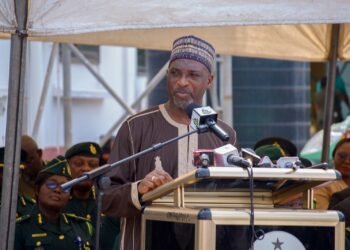The Accessible Soils and Sustainable Environments (ASASE) project has been launched in Ghana by Beyond Beans Foundation and other Civil Society Organization in partnership with the public sector. This four-year groundbreaking initiative will work towards ensuring an environmentally sustainable future for the cocoa sector, whiles tackling deforestation and rehabilitation of ageing cocoa farms as well as restoration of natural forests.
ASASE, which also means ‘land’ in the local Ghanaian Language Twi, is a 2.3 million Euro project co-funded by the Netherlands Enterprise Agency as part of the Sustainable Development Goals Partnership (SDGP). The project will work with 5,000 farmers in two of Ghana’s main cocoa producing areas namely, the Ashanti Region and the Eastern Region. With a belief that a climate-smart cocoa sector is achievable, the ASASE project seeks to support cocoa farmers in their rural communities by shifting focus from direct supply chain issues to sensitizing and providing trainings on agroforestry practices as well as land and tree tenure documentation to improve the long-term security of cocoa farms.
Additionally, the project seeks to facilitate the conservation of forests and the reforestation of degraded areas through approaches such as Payment for Ecosystem Services, where farmers receive (in-kind) value in return for their efforts to protect or even re-build forests around their cocoa farms.
With 800,000 households across Ghana relying on cocoa for their livelihoods and the country at a high risk of deforestation, making commitment to prevent further conversion of forest zones into cocoa producing lands is imperative. Natural forests capture carbon dioxide, increase biodiversity and improve soil quality, providing ecosystem services that benefit rural communities. With lower rainfall and rising temperatures affecting cocoa production and subsistence crops by reducing yields, cocoa farms without tree covers are exposed to harsh sunlight that can damage cocoa trees.
In an attempt to create an environmentally sustainable cocoa sector, it is vital to bring together diverse national and international stakeholders to build on the existing sector-wide Cocoa and Forest Initiative’s (CFI) efforts to end deforestation and restore forest areas. The documentation of land and tree rights to make cocoa production more sustainable in the long term demonstrates particularly the ASASE Project’s innovative approach and strategy to drive a long-lasting change in the cocoa sector.
The Ministry of Lands and Natural Resources (MLNR) will ensure that the project aligns with national policy and will use the outcomes to develop future policies to ensure the longevity of this intervention, whiles the civil society organization, TropenBos Ghana will bring a wealth of technical expertise in the development of environmental trainings for farmers, as well as their extensive local network. Meridia, West-Africa’s Land Rights Specialist, will lead the provision of land and tree tenure rights for farmers. Meridia has been dedicated to securing affordable land rights for smallholder farmers and has spent the past 5 years developing the highly successful FarmSeal and TreeSeal tools for the Ghanaian context, providing smallholder farmers with security of land tenure through customary land certificates and the freedom to take care of their trees.
The leading partners of the ASASE project are the commodity trading house, Export Trading Group (ETG) and their associated sustainability foundation, Beyond Beans (formerly Cocoanect), whose leadership team bring over 25 years of experience working on sustainability in the cocoa sector.
With this joint effort, the project is designed to create maximum impact at all levels, paving the way for a cocoa sector where cocoa farming can thrive alongside Ghana’s natural environment.
Read Also : Patronize CCMS & CFI – Mr Awotwe-Pratt to Cocoa Farmers



















